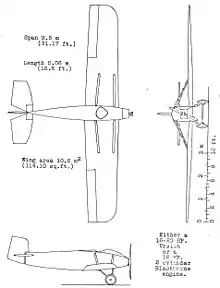Avia BH-16
The Avia BH-16 was a single-seat very light sport aircraft built in Czechoslovakia in 1924. Like other early Avia designs, it was a low-wing braced monoplane of wooden construction. It could be powered by either a 12 kW (16 hp) four-cylinder Vaslin engine or a 19 kW (26 hp) inverted-V twin-Blackburne Tomtit.[1][2]
| BH-16 | |
|---|---|
.jpg.webp) | |
| Role | Sports plane |
| Manufacturer | Avia |
| Designer | Pavel Beneš and Miroslav Hajn |
| First flight | 1924 |
Specifications (Vaslin engine)

Avia BH-16 3-view drawing from NACA-TM-301
General characteristics
- Crew: one pilot
- Length: 5.13 m (16 ft 10 in)
- Wingspan: 9.50 m (31 ft 2 in)
- Wing area: 10.6 m2 (114 sq ft)
- Empty weight: 130 kg (287 lb)
- Gross weight: 238 kg (525 lb)
- Powerplant: 1 × 4-cylinder Vaslin , 12 kW (16 hp)
Performance
- Maximum speed: 116 km/h (72 mph, 63 kn)
- Range: 500 km (310 mi, 270 nmi)
- Service ceiling: 2,000 m (6,600 ft)
- Rate of climb: 1.0 m/s (200 ft/min)
References
| Wikimedia Commons has media related to Avia BH-16. |
- Serryer, J. (24 July 1924). "Les avionettes Avia". Les Ailes (162): 2.
- "Aeroshow at Prague". Flight. XVI (23): 362. 5 June 1924.
- Taylor, Michael J. H. (1989). Jane's Encyclopedia of Aviation. London: Studio Editions. p. 86.
- Němeček, V. (1968). Československá letadla. Praha: Naše Vojsko.
This article is issued from Wikipedia. The text is licensed under Creative Commons - Attribution - Sharealike. Additional terms may apply for the media files.